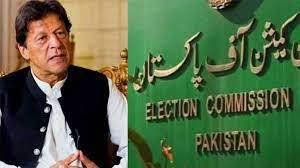ISLAMABAD - Pakistan Tehreek Insaaf [PTI] Chairman and former prime minister Imran Khan was disqualified yesterday for five years following his conviction in the Toshakhana case.
The Election Commission of Pakistan [ECP], in its Tuesday’s notification, stated that PTI chief Imran Khan has been disqualified after being found guilty of corrupt practices under Section-167 of the Elections Act, 2017 and his jail for three years.
The country’s top election body declared Imran Khan disqualified for five years and also de-seated him from the NA-45 constituency.
“As a consequence, Imran Khan has become disqualified under Article 63(1)(h) of the Constitution of Islamic Republic of Pakistan read with Section 232 of the Elections Act,2017,” according to the notification.
Imran Khan was sentenced to three years in prison and a fine of Rs100,000 on August 5, 2023, in the Toshakhana case.
A reference was forwarded by National Assembly Speaker Raja Pervez Ashraf to the Election Commission asking it to probe the matter. In October 2022, the electoral body had declared the former premier guilty of corrupt practices and filed a complaint in an Islamabad court.
In a related development, Pakistan Tehreek-e-Insaf (PTI) in a pre-emptive move to counter the expected adverse decision of the ECP, nominated Imran Khan as the lifetime chairman of the party. The decision was taken at a time when PTI chief Imran Khan is serving a three-year jail term in Attock Jail following his conviction in the Toshakhana case. The ex-premier faces the threat of being stripped of the post of party chairmanship.
The Core Committee of the PTI that met under the chair of its senior leader Shah Mahmood Qureshi passed a unanimous resolution stating that “Imran Khan will remain lifetime chairman” of the party, according to an announcement made by the party after the huddle.
During the crucial meeting of the Core Committee, the participants were given a detailed briefing on the appeal filed against the Toshakhana decision by the legal team and PTI lawyers’ meeting with the party chairman in jail, besides other related matters.
The committee, which is the highest level forum of the party that now runs PTI in the absence of Imran Khan, also decided to challenge the decision of Council of Common Interests (CCI), approving results for 2023 census, before the Supreme Court. The decision was made with the approval of Khan.
The meeting stressed that general elections should be held within the given timeframe under the Constitution after the dissolution of the National Assembly.
The Core Committee also decided that it would challenge the recent amendments, made in the Official Secrets Act, before the apex court to protect the basic human rights and civil liberties. Earlier in the day, Imran Khan moved the Islamabad High Court (IHC) challenging his conviction in the Toshakhana case.
A division bench of IHC comprising Chief Justice of IHC Justice Aamer Farooq and Justice Tariq Mahmood Jahangiri will take up today the petition moved by Imran’s counsels including Barrister Ali Zafar, Sardar Latif Khosa Advocate, Babar Awan, Salman Akram Raja Advocate, Shoaib Shaheen Advocate and Barrister Gohar Ali Khan Advocate.
In his petition, he adopted the stance that he is aggrieved of and dissatisfied with the conviction in the gits case. He added that the said impugned order is not sustainable and is liable to be set aside.
He further said that this order is without lawful authority, tainted with bias, is a nullity in the eye of law and is liable to be set aside.
Khan’s counsels claimed that the impugned judgement has been passed “with a pre-disposed mind” of the learned trial Judge to convict and sentence the appellant irrespective of the merits of the case.
They contended that the judgement was announced despite the fact that before commencement counsel for the appellant was very much in court fully prepared to address arguments after explaining the reason for his delay in arriving in the court. The counsels further said that the impugned judgement being tinged with bias, and having been passed without affording any proper or adequate opportunity to the appellant’s counsel to submit arguments in support of his defence, is no judgement in the eye of the law.
They also argued that the judgement in the absence of the appellant and without marking the presence of the appellant’s counsel is illegal and in violation of the explicit provisions of law.






